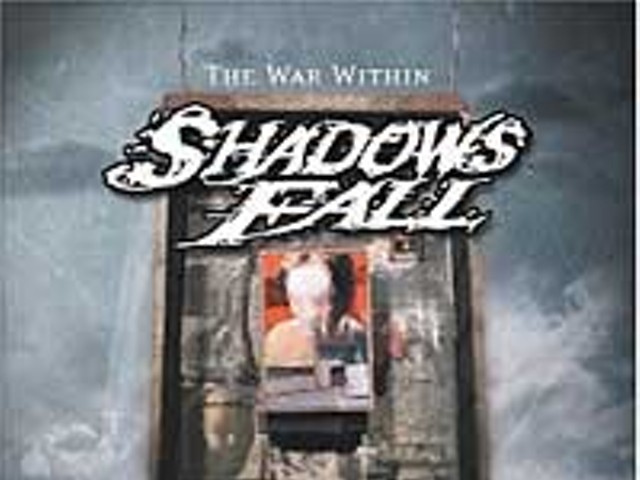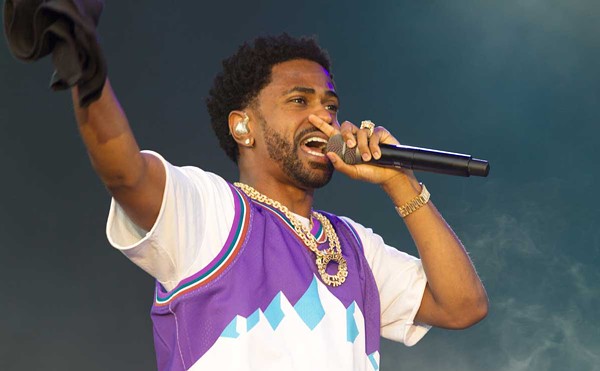“What I like, I lick, and this ain’t no bullshit, and those looking for bullshit are gonna get full of bullets and shiiiiiit,” Kalimah Johnson says, or, rather, roars, as she closes out another packed poetry night at the Meetery Eatery, where she’s the host.
Later, Johnson trades hugs for smiles as she thanks a crowd for making it out on another chilly Friday evening in Detroit. When all but a few stragglers are left in the tiny café, a twentysomething guy in blonde dreads asks to purchase a signed copy of Johnson’s CD, DatsWhatImaDu. The heavy-set woman obliges, pulls out a Sharpie and quickly scribbles her autograph on the disc’s insert. She hands the CD to the buyer in exchange for a wrinkly $10 bill. She then retreats to a nearby chair and a waiting cup of coffee, where she sighs with exhaustion. It’s a tiredness, she says, that she’s ashamed of. It’s 12:30 a.m. and it wasn’t that long ago when her nights would just be starting up about now.
“That’s one thing I don’t miss. Shows wouldn’t end till 1, and then I’d have to go to the studio,” she says, flipping her skinny dreads back, smiling.
Johnson is a breathing artifact from a hip-hop generation that Detroit has forgotten: a time before Em’, Proof, Slum, the Shelter and Lush. A time when the Eveready Crew, KGB, the Food Stamp Boys, Silvery, the Lacruso Girls and Fresh Kid Prince Vince would gather at Future Funk Records (which would later become the Hip-Hop Shop) or Henry’s Palace to hang out, write rhymes and, of course, battle.
Johnson says with a thoughtful (which is easily interpreted as nostalgic) laugh, “Those were some wild times, but I’d be lying if I said I didn’t miss them.”
Here’s the first half of Kalimah Johnson’s story in a nutshell: She was raised by a single mother on Detroit’s north side and got into rap in the early ’80s by listening “to the boys do it.” She’d rap downtown with a hat laid out for cash. In two years she dropped out of school to join Job Corps in Grand Rapids. There she met and battle-rapped future Detroit’s Most Wanted emcee Motsi-Ski. By 1986, Johnson was back in Detroit and enrolled at Highland Park Community College. That didn’t last. She wanted a career in hip-hop. So she quit school again and became Nikki D.
“I wasn’t feeling school,” she says. “I made my stage name Nikki D, and my boy Reggie Fresh [a Detroit rapper] hooked me up with some studio time where Ready For The World used to cut and I recorded my first demo, Rock Ya World.”
The late ’80s was certainly an embryonic time in Motor City hip hop. No one was wearing platinum, much less hanging it on walls — it was more about eager rhyme slayers attempting to carve out identities for themselves and their city, hoping somebody would take notice. Johnson was no different.
“Everybody was trying to get off the ground,” she says. “We all had camaraderie on some level because everyone was still local.”
Johnson continued to grind the streets at every open mic and under every streetlight she could find.
“It took a minute but things started popping,” she says. Her coffee’s kicking in and she’s up, moving around, smiling, telling this story with a Little Leaguer’s first-game enthusiasm. “I started getting gigs from Ms. Maddox at Candy Productions, Rico Cortez promoted shows at Watts for me, and then I hooked up with Edward Poe.”
Poe and his partner Daryl Nicholson developed a label called Urban Suburban to put out Johnson’s first 12-inch, “Work that Sucka.” The single received spins from high school DJ Reggie Reg and local radio host Billy T, and the airplay got her coveted opening slots on shows with Public Enemy, Boogie Down Productions, J.J. Fad, EPMD, MC Lyte, Rob Base and Rakim.
Her hometown rep as a badass emcee with dope flow flowered.
“I was basically known as a mic ripper and since I was a lady about it, cats used to eat that shit up,” she says.
But Johnson wasn’t the only female rapper wreaking havoc on eardrums. Hip-hop diva Smiley (who now hosts a local radio talk show) was a local celebrity with her radio hit “Smiley But I’m Not Friendly.” Despite what peers and scenesters said at the time, Johnson says she never had a beef with Smiley.
“People used to try and pit me and Smiley against each other, but we were cool. I think it was because we were the only two female rappers trying to do it big, but there was never a beef,” she says.
After a dispute over the “Nikki D” moniker with a New York female emcee, Johnson changed her name to “Eboni and Her Business” and in 1989 signed with local upstart World One Records. But the late-night smoke-infested studio sessions, shady show promoters and lack of fiscal return took their toll on the young emcee.
“I called my DJ and dancers over for a meeting and told them that I was going to enroll back in school and I didn’t know how long I was going to stick with rapping.”
Johnson’s local glow on rap stages soon faded. And the agony of rehashing old aspirations and memories is not the part of the story she was looking forward to telling tonight, or any night.
World One was going to be her last hurrah at being the next big thing. They had already had moderate success with their premier group Kaos and Mystro. They signed Johnson and another local emcee (Dice) at the same time. The plan was for Dice’s album to drop first, sell well and then pay for Johnson’s. The plan fizzled.
In 1990, Johnson’s album Civilized was released with no fanfare, no promotion, no radio play and, hence, no hope. Then, after hearing Billy T use one of her tracks in the background of a silly Bevis and Butthead radio segment, she was through. She even tossed all of her hip-hop contest awards into the trash. “I didn’t value them; I felt I should have made it bigger.”
Since then, Johnson has gone on to earn bachelor’s and master’s degrees in social work from Wayne State University. She now works as a sexual assault therapist for the Detroit Police Department. And to soothe the pangs of not performing, Johnson turned to spoken-word poetry for a creative outlet.
“Poetry is something that I had always done,” she says. “I knew very few of us were going to make a living out of hip hop, so life had to go on.”
In 1997, Johnson made her debut poetry stand at the Cass Café, and by 2003 she was the cornerstone of the Detroit Slam team, and opening for Def Poet Stacy Ann Chin, ex-Cosby kid Malcolm-Jamal Warner, and the Last Poets. She most recently inked a distribution deal for DatsWhatImaDu with Golden Rod Records.
The disc is a melodic and insightful nine-track poetic monologue produced by local soul songstress Inos Sivad. Johnson’s lyrics are still as bold as in her Nikki D days, but decidedly more mature and thoughtful.
Though the rapping days are behind her, she does at times wish she had continued rapping. And of contemporary Detroit emcees, she lists Versiz and Slum Village as her favorites.
What does she think about the present-day Detroit rap scene as a whole?
“Back then we left the fighting and the killing to the dope-dealers,” she says. “These Detroit emcees need to open their minds and develop more global thinking and writing.”
The chairs have been placed atop the tables, and the background music turned off. As her eyes reflect the ceiling’s track lighting, she considers for a moment the wisdom she’s gleaned from her Detroit run in hip hop. Regrets? Maybe a few. But Johnson wouldn’t change a thing.
“We had to sacrifice a lot to hold that mic back then, but those sacrifices gave us the tools to be better adults.”
Kahn Davison is a freelance writer. Send comments to [email protected]





